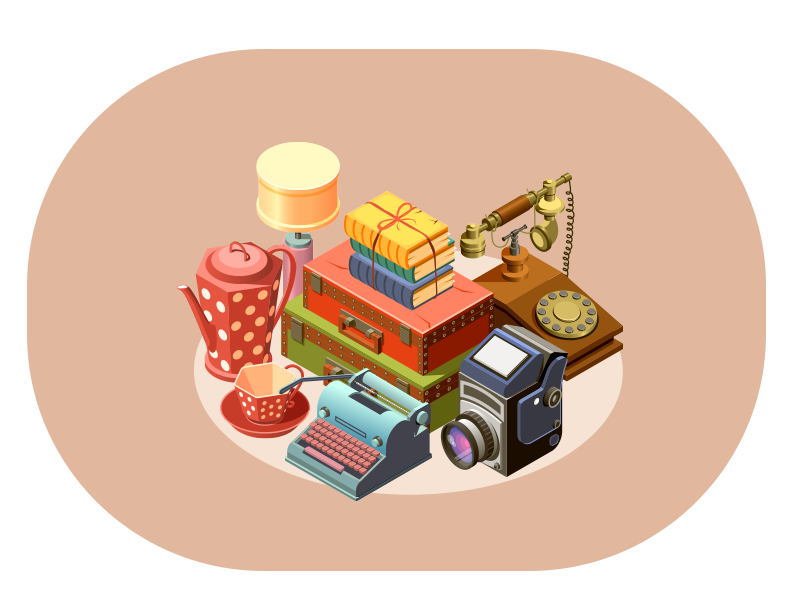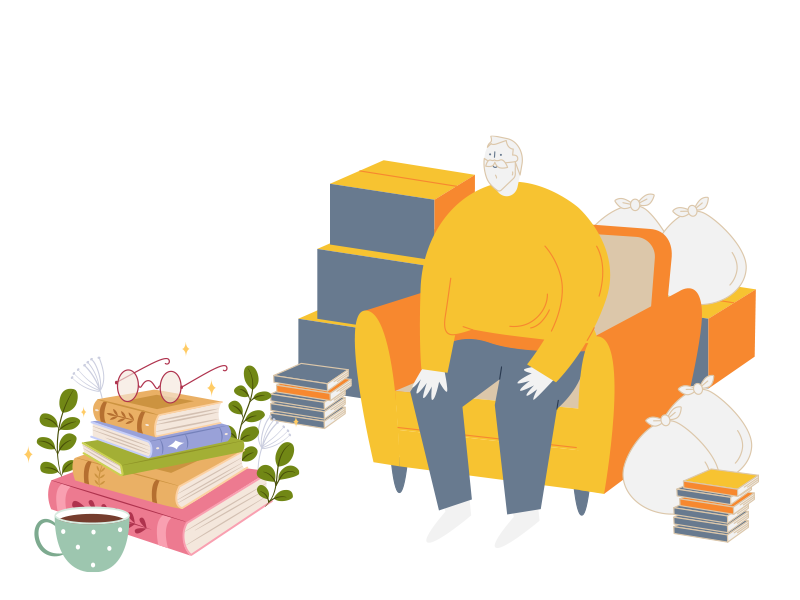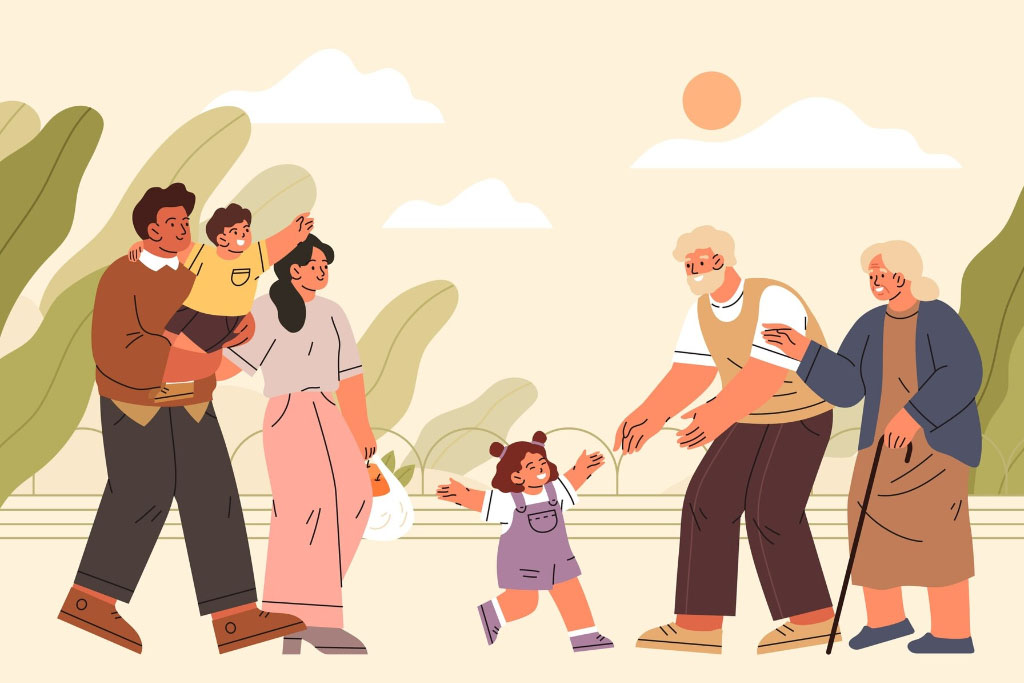Living with a Hoarder: How Hoarding Affects Families

What Is Hoarding?
Definition of Hoarding
Hoarding is not a moral weakness. It’s a worsening of obsessive behaviors characterized by compulsive shopping and collecting, difficulty letting go of belongings, and denial when the behaviors interfere with daily life. In the US, up to 19 million people may suffer from it. However, that number doesn’t reflect under-reporting due to denial or shame. The number of people affected by a loved one with HD is much higher.
What Hoarding Disorder Feels Like
The condition starts early and intensifies over time. Many causes may be involved, including genetics, family history, a difficult childhood disturbed by poverty, hunger, isolation, frequent moving, unpredictability, and abuse of various kinds. Traumatic events and losses in adulthood can also trigger HD.
For hoarders, surrounding oneself with an increasing number of belongings provides a feeling of protection as reminders of pleasant memories compensating for loss and emptiness. Individuals may stock up on certain items to secure abundance in dread of a looming crisis. They don’t engage in sorting or organizing, and little is ever discarded. Some individuals focus on food or live animals, and may eventually refuse to remove moldy food or pets’ corpses. In the worst cases, rotting garbage and waste products amass unchecked.
Other mental health conditions such as low self-esteem, depression, anxiety, self-focus, difficulty making decisions and completing tasks, and poor motivation commonly occur with HD. The basic drive to clean one’s “nest” is absent. A vicious cycle results in frustration, guilt, and shame leading to secretiveness and avoidance of people.
Hoarding Disorder Impacts Others
The effects of hoarding aren’t confined to the hoarder. Medical personnel and utility and repair technicians have no room to function. The growing amount of clutter overtakes every room. In extreme cases, all available surfaces are covered with the hoarder’s belongings. The saying “A place for everything and everything in its place” becomes irrelevant because there is no space for tidying. Severe cases of HD create health and safety dangers to other people in the neighborhood as pest infestations and fire hazards develop.
11+ Years Experience dealing with Hoarding
Need someone to talk to that understands hoarding?
Get a Free Hoarding Clean-up Estimate.
Or call us today for immediate assistance.
Emotional Impact on Families

How hoarding affects families? We often hear about hoarders’ lives but not the consequences to family members whose voices are seldom heard. In a well-adjusted family, each member has a role, but when one person’s behavior overtakes the family dynamic, the structure is changed forever.
“You Love Your Junk More Than Me”
Support groups promote sharing common experiences, and a common theme emerges from families in homes where hoarding problems exist: feeling rejected and less valued than the “stuff.” Personal space is invaded. The need for privacy and personal boundaries is ignored. Spouses and partners lose intimate connection and children can’t enjoy childhood activities. Hoarding is not a single event but a malignancy. Even family members living elsewhere feel conflicted because they can’t change the situation and don’t know how to help.
The Elephants in the Room
Relationships are built on trust but become strained to the breaking point when trust and respect are gone. Family members may try to communicate their needs but conversations frequently escalate into arguments. The hoarder usually can’t acknowledge the problem. Tension mounts, especially when preventable “accidents” occur. Instead of being a relaxing haven, home is a chaotic, cluttered mess of one person’s creation. Anger, the natural result of unmet needs, builds as family members feel trapped in a hopeless conflict. Without intervention, the expectation of crisis is realistic.
Loss of Social Interaction
People are meant to support each other in times of need, but HD causes shame and isolation for everyone involved. Instead of reaching out to others, hoarders usually withdraw. Memories build on memories, so they become conditioned to expect to live a certain way, hopeless and helpless. Poor personal hygiene is a common symptom of hoarding, and family members seek social contact away from the home. Although the hoarder continues to deny the problem, he or she often feels unwanted and miserable, declining opportunities to socialize. The home is no longer a place for special family get-togethers or mutual support during painful events. The food can’t be trusted, the air is stale and smelly, and the toilet may not even flush.
Growing Up in a Garden of Garbage
How hoarding affects children is considered by some professionals to constitute child abuse, but the laws vary from state to state. Childhood is supposed to be a time for exploring and learning about the environment as well as oneself. In hoarding situations, the home provides no room for exercise, studying, or social interaction. Children learn that adults won’t protect their privacy or personal boundaries and that they have no right to any personal space. One family member’s belongings fill the home in a way that no other member has room for self-expression. Due to the anxiety pervading the home, children are unable to learn how to foster normal bonds with other people. Neighbors may shun a hoarder’s family but the children never understand why.
When questioned about living with a hoarder, adult children describe recurring nightmares steeped in shame. Many share the idea that their parent chose garbage over them, so how can they feel good about themselves? Some talk about feeling dull “with no expectation of joy.” Others express a fear of turning into a parent who hoards. Such a childhood sets the stage for accepting abuse later in life. For many, their childhood is lost to parentification, the situation when a parent’s dependency reverses the roles by putting the child into the parenting role.
Practical Challenges for Families

The effects of hoarding on family members of all ages are significant.
How HD Affects Health
Poor housekeeping has consequences. Exposed food attracts insects, spiders, and rodents. Poor pet care allows fleas and skin diseases to spread. Unclean drains foster bacteria and flies. Humidity and poor ventilation promote mold. Unwashed laundry breeds dust mites. An unusable kitchen means poor nutrition leading to a weakened immune system, slow healing, and unstable blood sugars. The overcrowded home prevents exercise, contributing to depression and frailness.
How HD Affects Safety
The effects of hoarding on family members also extend to safety in the home. Using bathtubs and sinks for storage can result in clogs that damage plumbing. Junk on the floor, on stairs, and in doorways blocks pathways to escape from fire, flooding, and home invaders. In addition to preventing access to first aid supplies, blocked pathways cause falls. When clutter is too close to electrical outlets, fires can start and quickly spread. Another danger of blocked doors is that emergency personnel can’t gain access to patients in need of care.
How HD Affects Financial Security
Hoarders’ finances are strained by unnecessary shopping. The person with HD, living in a constant state of anxiety, often wastes money stockpiling food “just in case” of anticipated disasters. New expenditures arise when important documents go missing. Credit card spending can skyrocket out of control. Fees accrue with ordinance violations involving sanitation, overgrown yards, and inoperable vehicles. More financial hardship results from plumbing and electrical damage and failure to pay bills.
Coping Strategies for Families

Declutter Your Own Mind First
1. Prioritize: Not everything is your responsibility, your decision, or your fault. Pause often to take slow, deep breaths. Consider “SAFETY FIRST.” Act on safety needs first.
2. Learn: Learn more about HD from the library, your family doctor, support groups, and online medical sites. Ask questions.
3. Ponder: Revise the Serenity Prayer to seek “the serenity to accept the things I cannot change, the courage to change the things I can, and the help of others to see the difference.”
4. Set boundaries: Care for your own well-being first. You’re a helper, not a sacrifice.
Effective Communication
Living with a hoarder means creating a comfortable climate for gentle conversation. Lessening tension makes a difference. Studying the technique of Active Listening teaches you to focus on the concerns of the speaker instead of your own. Avoid blaming but ask for feedback about what might make the situation better. Your communication partner needs to feel safe from judgment, threats, and negative responses. Hoarders are often blind to what they do to their loved ones because they’ve been overwhelmed by past losses. Understanding this will help guide you in difficult conversations. Like training a puppy, keep your sessions short, ease off if you notice signs of agitation, and end on a positive note. It will get easier for both of you with time.
Small Steps in the Right Direction
As a child, did you ever so feel frightened that you hid yourself under the blankets on your bed, maybe hugging a favorite stuffed toy? How would you have felt if someone jerked the blankets off? Now you understand how individuals with HD feel when someone invades their home to take away their belongings.
Experts in crisis management suggest no sudden movements, no yelling, no threats. Instead, ask permission before you take action. Let them talk about their feelings and accept their feelings as real. Be kind and treat them with respect. When dealing with hoarders, don’t make references to their behavior as “disgusting” and don’t call their belongings “junk.”
You can’t force acceptance from people in denial, but you can make small mutual agreements. Let them choose a small task to work on toward decluttering. Your job is to help decrease anxiety associated with giving up something. Making small steps in the right direction is a process, not a straight line, so stops and starts are normal.
One helpful task is to clean a place for sharing small positive social events. Making good memories helps build over bad memories. The goal is not to complete a project but to decrease isolation and help the person with HD feel part of society again.
It’s Okay to Get Help
Needing help is normal for all of us: learning to use a computer, moving to a new place, and dealing with illness. It’s the job of professionals to help. Being experienced means that they’ve seen almost everything, so don’t feel embarrassed to share your concerns. HD specialists are increasingly available as mental health issues come out of the closet, and they’re familiar with the challenge of patients denying they have a problem. They also understand how hoarding affects families.
Here’s what to expect:
- The intake appointment gathers information and begins exploring possible treatment methods.
- “Talk therapy”, especially CBT (cognitive behavioral therapy), seems to help patients willing to participate. It involves identifying painful thoughts and feelings, then substituting activities that bring relief.
- No approved medication for HD exists but mental health providers sometimes prescribe medications for depression and/or anxiety.
- HD doesn’t have a cure yet, but it can be managed, especially when the person with HD agrees to be active in the treatment plan.
To Recap
Living with hoarders is a challenging mental health condition. To review:
- HD affects individuals’ ability to live independently and maintain functional well-being.
- HD causes families to suffer from the consequences of the abnormal and damaging emotional and physical environment.
- HD affects everyone’s health and safety.
- Management strategies include education, support groups, and mental health specialists who often use CBT and assistive medication.
- An active subject in modern neuropsychological research, an increasing number of clinicians are working hard to find ways to manage the condition. There is hope.
“Look for the Helpers”
Mr. Rogers understood how it felt to be afraid and alone. He shared his mother’s advice to “look for the helpers. You will always find people who are helping.”
Clutter Trucker & How We Can Help You
Clutter Trucker is a professional debris removal service specializing in extreme cleaning and hoarding cleanup in Denver, Colorado Springs, and surrounding communities. We understand from personal experience how hoarding affects families. Knowing that belongings are connected to memories and emotions, we respect how tough it is for someone dealing with hoarding cleanup. Want more info? Call us today.

About Jennifer Hanzlick
Clutter Trucker is a Denver-based hoarding clean-out company founded by Jennifer Hanzlick. Jennifer leveraged 15 years of corporate experience in to start the company in 2008. Her mission is to help and educate individuals and their loved ones who have hoarding disorder. A featured speaker at Ted X Boulder, Jennifer works directly with community and non-profit organizations to boost public awareness about the condition. To that end, she founded the Colorado Hoarding Task Force in 2015.
 720-982-7856
720-982-7856







